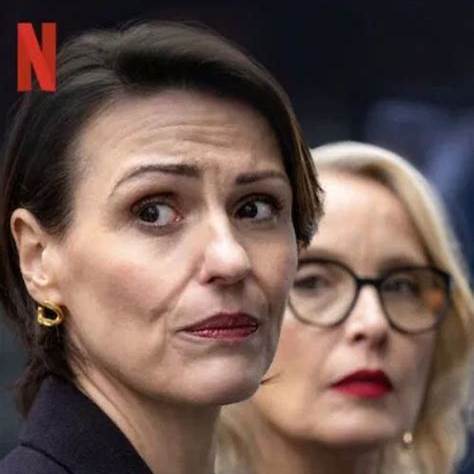The five-episode miniseries Hostage, starring Suranne Jones and Julie Delpy, manages to be both tautly entertaining and politically astute, even while leaving viewers wishing there was more. At its core, the drama is about power under pressure—what happens when leaders are pushed to their limits, when diplomacy collapses, and when trust is in short supply.
Jones, playing British Prime Minister Abby Dalton, is a commanding presence from the first moment she appears on screen. She combines resolve and vulnerability in a way that feels completely convincing, grounding the story with a realism that makes the viewer believe this is how a prime minister might behave behind closed doors. Her performance is layered with both a steely control and a flicker of fear that occasionally flashes through, reminding us that Dalton is not just a leader but also a human being grappling with impossible choices. Delpy, in turn, is her perfect counterbalance—intelligent, unpredictable, and every bit as nuanced in her choices. Watching these two actresses spar, ally, and circle one another becomes the heart of the series, and the chemistry between them is electrifying without ever feeling manufactured.
What sets Hostage apart from other political thrillers is its willingness to get messy with the geopolitics. The show doesn’t shy away from showing how fragile international alliances can be, or how quickly personal ambition and national pride can complicate negotiations. Several of the episodes draw sharp parallels to real-world turmoil audiences see splashed across news headlines, and it is that proximity to reality that makes the show feel so believable. The political stakes never seem inflated for dramatic effect—they feel, instead, like an extension of truths we already suspect. The sense that this could actually happen is what makes Hostage so riveting, as though the viewer has been invited into a secret chamber of power where decisions of life and death are being made.
The writing deserves credit for balancing intimacy with spectacle. Scenes set in grand meeting rooms or on the floor of Parliament have a scale befitting the story’s stakes, but the quieter moments—conversations between Dalton and her advisors, private phone calls late at night, moments of reflection when she’s caught alone—are what ultimately give the show its emotional heft. Delpy’s character in particular is afforded some brilliant dialogue that showcases both her wit and her unpredictability, and the show is at its most engaging when she and Jones are locked in verbal combat.
That said, no show is flawless, and Hostage does have its shortcomings. There are two or three plot holes that stand out more than they should, distracting from the otherwise seamless narrative. Certain actions by supporting characters are never fully explained, and in a story so tightly wound, those gaps feel more like oversights than creative ambiguity. The pacing, while brisk and tense, sometimes sacrifices depth for speed. Just as frustrating is the decision to limit the story to five episodes. The narrative feels truncated, and a couple of storylines cry out for more breathing room. Expanding the miniseries to seven episodes might have allowed for fuller character arcs and deeper exploration of the political subplots. The tradeoff is that the series never lags, but there is a lingering sense of what might have been if the writers had a bit more time to flesh things out.
Even with these flaws, the series rarely loosens its grip on the viewer. The direction is taut, and the visuals convey both grandeur and claustrophobia—the two poles of political life. The performances elevate the material at every turn. There is a sense of urgency that courses through each scene, and when the credits roll on the final episode, it’s hard not to feel both satisfied and slightly deprived. The final episogde brings to mind that old bromide that if you pull out a gun, you’d better be prepared to use it. Well, the plot includes a a weapon, and the character wielding it is a surprise. I did not see that one coming. The ending provides closure, but it also leaves enough unresolved threads that viewers are bound to speculate about what could come next.
If the producers are looking at future possibilities, they’d be wise to expand Hostage into a longer-running series. Jones’ Abby Dalton is a character audiences would gladly follow beyond this limited run. She is tough, flawed, empathetic, and commanding all at once—a modern leader who feels like she belongs on the world stage of today.
Ultimately, Hostage is a riveting watch, a believable political drama that thrives on the strength of its leads and the immediacy of its themes. It succeeds in making the high-stakes world of diplomacy both thrilling and deeply human, and even with its imperfections, it leaves a lasting impression. If there is any justice in television, this will not be the last time we see Abby Dalton steering her country through crisis.




